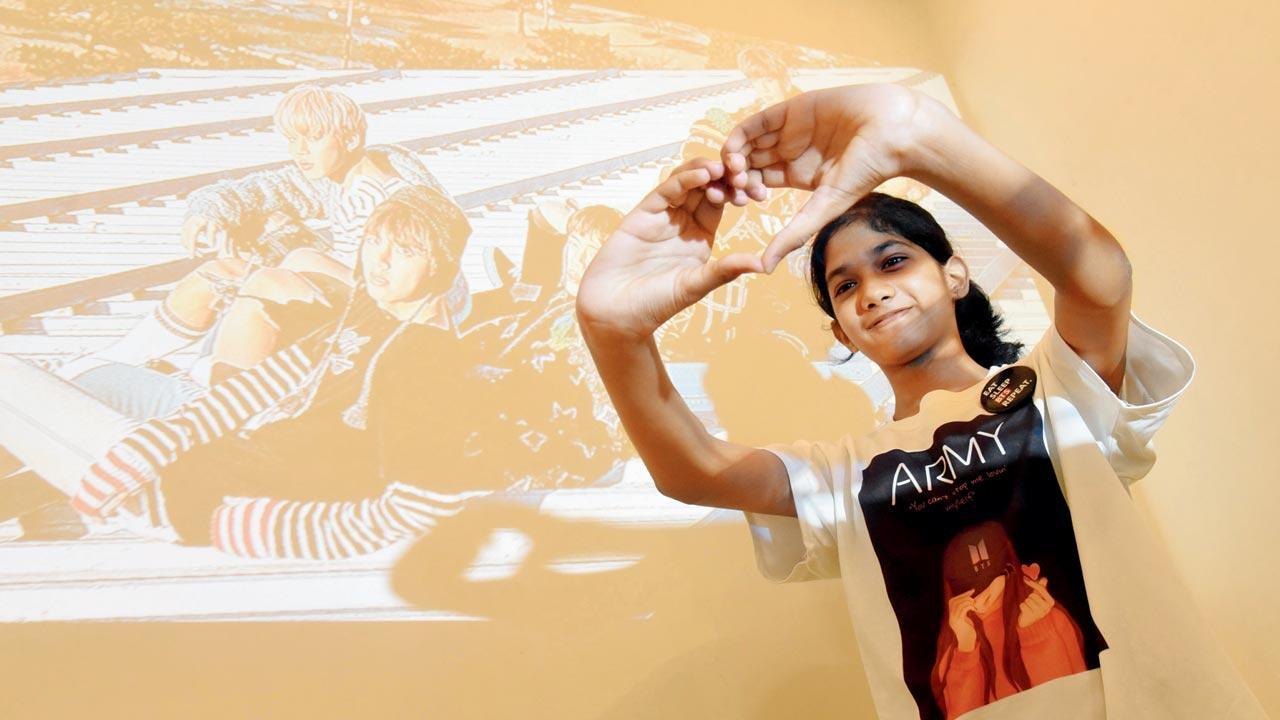K-pop sensation BTS released their second English single, Butter, last week. But that isn’t stopping their junior fans from learning Korean

Myra Punjabi took a one-and-a half-month course in Korean online. Pic/Sameer Markande
Until last year, I’d listen to One Direction. And then I was like, ‘What are you doing, Maahi? You should have gone the other direction?’” jokes 11-year-old Maahi Mukherjee, who is on the phone with us from Kolkata, where she is spending her lockdown. Mukherjee got introduced to Korean band BTS, only in 2020—a fact she regrets. But, she’s glad she joined the Adorable Representative MC for Youth (ARMY), which is what BTS fans call themselves. Don’t ask us what it’s supposed to mean, because we don’t have a clue. But pre-teens everywhere are hooked.
In fact, when this writer tried to decode why the band is such a phenomenon—their album, Map of the Soul: 7, became the first album in the world to surpass four million sales in 2020—she failed miserably. They are known to sing about mental health, positivity and the power of loving yourself, but how can one understand any of that, if they don’t know Korean?
Bhagyadha Thareja, 12, says she always has BTS’ music playing in the background, while she studies
Indian kids seem to have it all figured out. Mukherjee has been teaching herself Korean on Duolingo, a language-learning app, for a few months now, and often writes down words and sentences, and translates songs in her diary. Her mother Ria says, “Maahi uses Korean as a secret language. In the beginning, I was worried, when she started becoming obsessed about BTS, but when I read up about them, they seemed like a clean-cut band.”
Mukherjee has her own phone, and is on a WhatsApp group with other ARMY members, where they talk about all the cute habits the septet—Jin, Suga, J-Hope, RM, Jimin, V, and Jungkook—possess. “I have learned all the lyrics. Two years ago, when I first heard them, it all just clicked. They talk about positivity, especially in songs like Love Yourself, and I wanted to soak in the full force of their lyrics, and so, I started learning Korean. I am pretty good at it now,” says Mukherjee. When we ask her if she will grow out of this phase, she quips, “Once an ARMY, always an ARMY.”
Maahi Mukherjee writes down all the Korean she learns in her BTS diary
Like Maahi, 11-year-old Myra Punjabi is also committed to the cause of understanding the boy band better. She, in fact, signed up for a one-and-half-month online course in Korean, where she was the youngest person in class. Her mother, head-hunter Barkha, says that she approves of her daughter’s love for the band, because she is a vocalist herself. Punjabi likes the band because they promote inclusiveness and urge kids to love who they are, no matter what their gender. “They sing about never hating yourself for something someone else said. They ask us to look at ourselves closely in the mirror. I wanted to learn Korean, so I could understand them better. Everything they say has a very strong meaning.”
What we wonder about is what is it about the BTS lyrics that make them stand apart from other pop stars who sing in familiar English. This can be explained by Bang Si-hyuk, a singer-producer, who started assembling the band way back in 2010. In a 2018 interview to a Korean newspaper, he said that he had originally thought of BTS as a band of boys, who were “gentle, sympathetic idols who could mentor their fans”. “I recently came across a company document from [2012,] the year before BTS debuted, in which we were debating what kind of idol group to create. It said, ‘What kind of hero is the youth of today looking for? Not someone who dogmatically preaches from above. Rather, it seems like they need a hero who can lend them a shoulder to lean on, even without speaking a single word,” he was quoted as saying.
Amelia Redden
This is best explained by 15-year-old Mumbai resident Amelia Redden, who is also learning Korean. She says the band helped her love herself after she was traumatised by someone spreading negativity about her on social media. “I listened to them and realised I am what I believe about me, not what others think. I listen to them every morning before starting my day.” Bhagyadha Thareja, 12, says she always has BTS’ music playing in the background, while she studies, or spends time reading or writing. “At present, I am using Google Translate to help me understand their lyrics. But it’s so strange that even when I didn’t, I sort of connected to their soul, and their tunes. They are helping all of us.”
Also Read: How to ace the Japanese Hime haircut like your favourite K-pop celebs
 Subscribe today by clicking the link and stay updated with the latest news!" Click here!
Subscribe today by clicking the link and stay updated with the latest news!" Click here!







